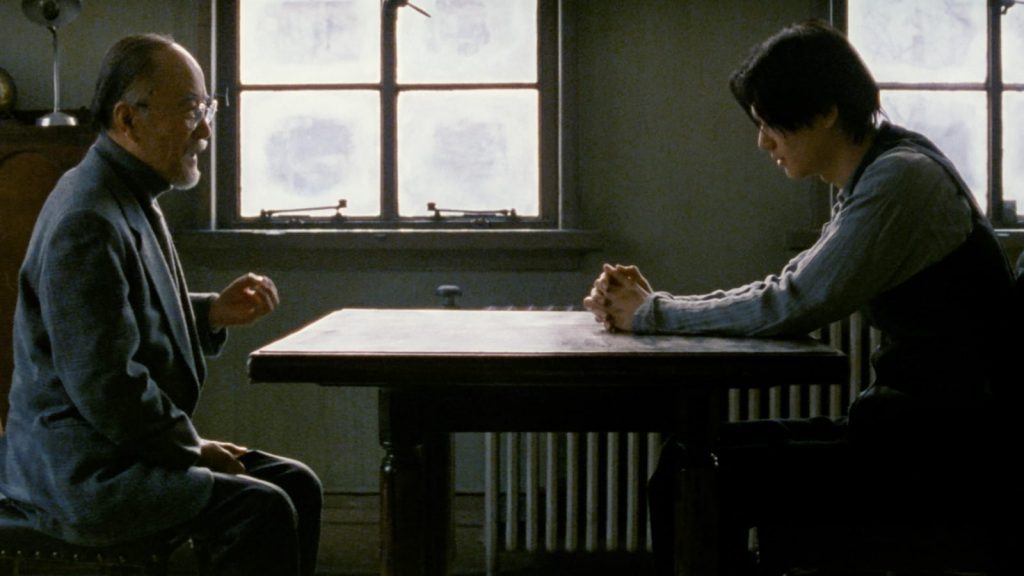If you could live in one memory for the rest of time, which one would you choose? Such a question is fundamentally overwhelming and very personal, and it is the subject of Hirokazu Kore-eda’s 1998 narrative sophomore feature After Life. The highly respected and acclaimed Japanese director recently got a larger spotlight with his brilliant Academy Award-nominated drama Shoplifters from 2018, but the auteur has been a favorite amongst cinephiles for several decades now. With this second narrative attempt Kore-eda goes for a relatively reserved but thematically expansive meditation of life and death. The portrait painted by the filmmaker shares less in common with the shiny and occasionally silly Defending Your Life and more with the introspective recent masterpiece Nine Days, which likely owes a lot to this earlier effort. There are no questions of heaven or hell; only the intellectually fascinating concept of what it means to be alive and what has value to a person when it all comes to an end. Its beauty is overwhelming, and it is as clear cut of a sign of authorial brilliance as there has ever been.
The concept is beautifully simple; when one dies they arrive at a way-station before they embark on the next stage of their existence. While one might hope for an opulent setting to be their first sight of the afterlife, the truth is this particular stop shares more in common with the shabby, underfunded bureaucratic nightmares you would see on earth. The recently departed souls are not confused in the slightest about their situation or interested in where they are – they are mostly happy to be guided wherever they are needed. They will be here for exactly one week, and once assigned a counselor they have three days to determine which of their memories they want to save for the rest of eternity. Once chosen, the staff will do their best to recreate that memory on film and send this with the subjects as a companion for the rest of time. The level of difficulty in choosing a memory is different from person to person, but one must choose or risk becoming one of the staff members who stick around to help others in the way-station.

Those wanting a traditional approach to this subject should adjust their expectations. There are not swelling orchestras or big, dramatic moments that shake up how this process is approached. The film is much more subtle than that, even going as far as incorporating some of Kore-eda’s documentary background here. Of the twenty-two souls being processed during this particular week, about half of them are real-life people that Kore-eda interviewed in preparation for the film whose stories he loved so much that he brought them into the narrative. One would be hard-pressed to suss out the professionals from the non-actors outside of some obvious narrative clues, but on a performance level they are equally as impactful.
It is fascinating to note what people decide to choose; one man, who initially speaks endlessly about his sexual conquests, eventually chooses his daughter’s wedding day. A teenage girl beams about a trip to Disneyland, then, after being clued in to how unoriginal that memory truly is, decides on something more personal. A man recalls a time when he was an infant and felt the autumn sunlight warming his face. Not all memories are of the happiest times of their lives, but often just the most memorable. One man reflects on making a connection with American forces after being captured in the war. It does not feel like something that you would want to live with forever, but it is that personal touch that makes things so interesting. Ichiro Watanabe (Taketoshi Naito), a 70-year old businessman who questions if he ever lived a life worth remembering is given a bit more screen time due to some traditional narrative tendencies. The way in which his life affects his case workers Takashi Mochizuki (Arata) and Shiori Satonaka (Erika Oda) is one of many moving moments.

As a lover of cinema, you also have to appreciate how much significance Kore-eda draws to the art of moviemaking. The way in which he incorporates the process of making a small independent film for each subject gives way to a bold vision and inventiveness that you cherish every second of. While often we treat films as a disposable entity, the truth is that they are one of the few things in this world that allow you to feel out of time. A great film can feel as if it is a series of unfolding memories meant specifically for you. Movies and memories are inextricably linked in a way that Kore-eda not only understands but feels passionately about. It is understandable that anyone who wants something more fantastical may become frustrated with the strict pragmatic approach to the world, but those who give themselves over to this examination will experience something beautiful. At the very least, it should make you reflect back upon your own life to determine what you value most. Can a film do something more important than that?

Video Quality
After Life comes to Blu-Ray with a new digital AVC encoded 1080p transfer in 1.66:1 approved by Hirokazu Kore-eda derived from a 2K scan of the 35mm duplicate negative made from the Super 16mm original camera negative. The presentation is simply lovely on all accounts as it maintains the natural filmic look throughout the entirety of the runtime. Skin tones are natural and consistent with subtle facial features easily noticeable in closeup. Black levels hold up well with virtually nothing in the way of crush. There does not appear to be any amount of digital noise due to compression limitations or other such nuisances. There were no discernible instances of print damage, and overall clarity and detail is magnificent. The picture holds up extremely well in long shots, and colors are well saturated in a visually splendid way. This new presentation is top-tier quality from beginning to end and should please any fan of the material.
Audio Quality
The Blu-Ray disc comes with a remastered LPCM 1.0 mono track in the original Japanese with optional English subtitles. Environmental sounds such as animal noises or weather effects are rendered well alongside everything else. Kore-eda intentionally does not utilize music in this film outside of the shabby band which sounds good here in its own bad way. There are never moments where outside elements threaten to overwhelm the dialogue, as the track maintains a good balance and fidelity throughout. There does not seem to be any majorly noticeable instances of age-related wear and tear. The Criterion Collection has given this film the perfectly preserved, faithful audio presentation it deserves.

Special Features
The Criterion Blu-Ray of After Life includes a foldout booklet featuring the essay “In Memoriam” by author Viet Thanh Nguyen in which he delves into the themes of the film, Kore-eda’s blending of fiction and documentary styles and much more that is very insightful. The on-disc special features are as follows:
- Audio Commentary: Film Scholar Linda C. Ehrlich provides an illuminating commentary track in which she delves into the career and style of Kore-eda, some background information on the performers, cultural details that may be unfamiliar to some and much more. Ehrlich has a very deliberate approach to this track and even takes small moments to listen in to some of the character moments to provide further details.
- Hirokazu Kore-eda: A new 19-minute with the director in which he discusses some of his family history and how it impacted the film, his early work in television, his decision to use non-actors in the film, working with his cinematographer and more. It is great to hear such thoughtful reflections on the film.
- Yutaka Yamazaki: A new 20-minute interview with the director of photography in which he discusses his career, meeting Kore-eda, getting involved with After Life, his approach to capturing an image, the physical process of creating a connection between the subject and the camera, the thinking behind certain creative decisions and more.
- Masayoshi Sukita: A new 16-minute interview with photographer and cinematographer Masayoshi Sukita in which he discusses his background, becoming involved in the film, his experiences appearing on screen, the difference between shooting a narrative and a documentary, his thoughts on the film and more.
- Treasure Of Memory: A 17-minute piece which presents unused material from the film including more time with the processes at the facility, additional interviews with the subjects, a lunch scene in which some of the subjects speak with one another about their experiences and more. There is some intriguing material here worth checking out if you are a fan of the film.
- Trailer: The two-minute trailer for the film is provided here which sets up the basic conceit of the film.
Final Thoughts
After Life is a truly beautiful effort from one of the modern masters, Hirokazu Kore-eda. Not only does this film make you take inventory of your own life and relationships with those closest to you, but it might even make you more empathetic to those around you. The feature is simply shot but deceivingly gorgeous with lovely performances from both the professional and non-actors. The Criterion Collection has released a Blu-Ray that features a sumptuous A/V presentation and a pleasing collection of special features. This is a truly rewarding experience from beginning to end. Highly Recommended
After Life is currently available to purchase on Blu-Ray and DVD.
Note: Images presented in this review are not reflective of the image quality of the Blu-Ray.
Disclaimer: The Criterion Collection has supplied a copy of this disc free of charge for review purposes. All opinions in this review are the honest reactions of the author.

Dillon is most comfortable sitting around in a theatre all day watching both big budget and independent movies.







